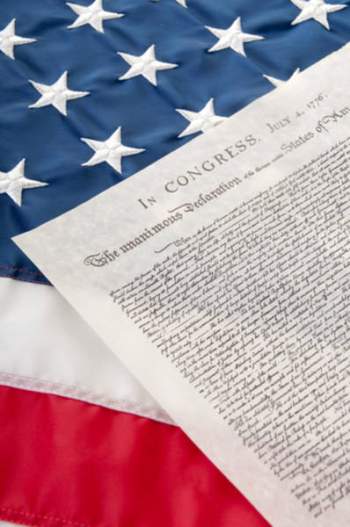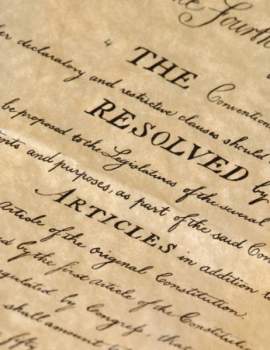
Understanding the 10th Amendment

Popular In Constitution
Purpose Of Lifetime Appointment And Pros And Cons Enumerated Powers Bicameral Legislature Background Article 3 Of The Constitution We The People 1st Amendment Who Wrote The Constitution Judicial Review Equal Protection Clause 5th Amendment 10th Amendment Three Fifths Compromise
The Tenth Amendment bears a certain resemblance to the Ninth Amendment in that it grants authority or powers to a certain faction that are not explicitly included or enumerated under the United States Constitution. However, in the case of the Tenth Amendment, the powers granted are to the State, rather than certain natural rights to individuals.
The text of the 10th Amendment reads, "The powers not delegated to the United States by the Constitution, nor prohibited by it to the States, are reserved to the States, respectively, or to the people." Under the United States Constitution, there are certain provisions that place responsibility or authoritative powers to the Federal government. However, other powers not strictly assigned to the central Government, and not explicitly restricted to the State, are to be granted to the States themselves.
The most important concept behind the Tenth Amendment is that it provides for the general principles of Federalism as the form of the United States Government. Federalism is the system of government in which the power to govern is shared between a national or central government and the state governments, which is divided under Constitutional provisions. This concept had already been addressed under certain provisions of the Articles of Confederation and was, once again, reflected in the drafting of the Constitution.
Under the Constitution, the branches of Government--the executive, legislative, and judicial--are granted powers as the central or Federal Government. The Tenth Amendment serves as a system of checks and balances by providing certain authority to the States, which would prevent the central Federal Government from garnering too much power and creating the potential of what the United States already had experienced with England.
The Tenth Amendment is evident in today's world and has modern applications. States will employ the Tenth Amendment in certain situations when they seek exemption from regulations created by the Federal Government. Federalism allows for states to impose certain laws that are to be governed by each individual state.
States will often have their own labor and environment controls that are free from Federal statutes. Such was the case in New York v. United States, where certain Federal laws imposed certain regulations regarding the Low-Level Radioactive Waste Policy Amendments Act. A particular provision was questioned and brought before the Supreme Court, with the State of New York claiming that the Federal Government did not have the authority to hold states liable for damages regarding waste. Under Federal provisions, States were responsible for all waste within their borders and would be liable for any damages incurred by such waste. The Tenth Amendment was upheld and the Supreme Court ruled that such an imposition violated the provisions under the Amendment.
Another example would be the Brady Handgun Violence Prevention Act, which required all states to conduct background checks on those seeking to purchase handguns. The Tenth Amendment would also render this Federal legislation as unconstitutional.
One of the current topics of controversy under the Obama Administration is in regards to an application of the Tenth Amendment to State medical marijuana laws. Currently, there are fourteen states that have implemented marijuana laws that permit its use for medical purposes. The passing of such state laws is legal under the Tenth Amendment, but the dispute arises out of the authority the Federal Government has over laws regarding illicit or controlled substances.



















